When Matthew Vaughn’s Kingsman: The Secret Service exploded into cinemas in 2015, it gave the iconic James Bond franchise much the same irreverent treatment that the director’s previous Mark Millar adaptation, Kick-Ass, gave to comic book movies. Reviews focused on how the film recontextualised the familiar 007 tropes of guns, girls and gadgets through the lens of class, identity and that notorious final bum note.
In the sequel, Eggsy and the Kingsmen run up against a crime syndicate known as the Golden Circle with a little help from their American cousins, the Statesmen. It neatly shows us that American iconography plays much the same role for their opposite numbers, that liquor-themed codenames will stand in for Arthurian monikers, and most accurately of all, that Channing Tatum is to America as Colin Firth is to Britain.
But how does this live up to the America of the James Bond movies? As franchises go, there’s none more British than Eon Productions’ family-run juggernaut, but nevertheless, the so-called ‘special relationship’ between the United Kingdom and the United States has played an interesting role for over half a century of the series’ history, both on and off screen.
The many faces of Felix Leiter
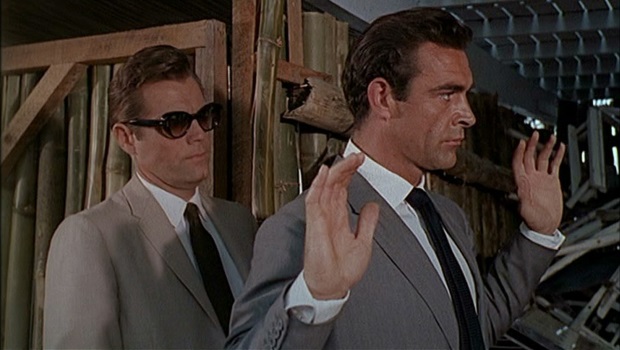
Arguably, it started with Felix Leiter, Bond’s friend and opposite number in the CIA. His continued significance in the series (and occasional lack thereof) is a signpost of how important or not America is to the escapades of this British hero, and he’s a character who has been played by eight different actors in ten different movies.
In print, he appears in the very first novel, Casino Royale, as an ally who lends 007 funds when he’s wiped out by Le Chiffre. The film series opted to adapt Dr. No as the first film, but added the character even though he didn’t appear in that novel.
Played by Jack Lord, Felix’s role in Dr. No is to share information and to rescue Bond at the end of the film – as in his literary debut, the American agent has resources that he puts at his British colleague’s disposal, a dynamic that continues between these characters over time. His character is slightly unimportant, as was clearly demonstrated when Lord requested more money and co-star billing to return in Goldfinger, and the producers simply recast the part.
America is more prominent in this third outing however, revolving around the titular villain’s plan to irradiate the US gold supply at Fort Knox, thereby increasing the value of his own bullion stockpiles. Again, the Americans aren’t the major players and Cec Linder’s Felix is largely running around after Bond, who eventually ditches out of a plane en route to dinner with the US President after a climactic tangle with Goldfinger.
Less than competent American characters
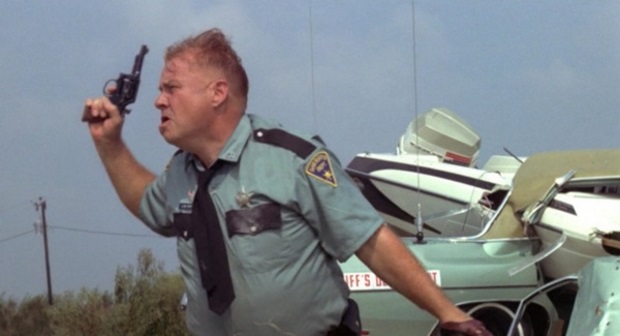
As the most financially successful film in the series at that point, Goldfinger was something of a template for Diamonds Are Forever, including another new Felix and a Las Vegas-centric storyline involving a Howard Hughes-inspired tycoon called Willard Whyte, who has been duped by SPECTRE. The American characters are represented as uniformly daft, from Whyte to the two guileless Bond girls, Plenty O’Toole (Lana Wood) and Tiffany Case (Jill St. John) via a number of dimwitted goons working for Blofeld.
This trend for the dumb and/or incompetent American characters was most prominent with J.W. Pepper (Clifton James), a loud-mouthed good old boy sheriff from Louisiana who was outfoxed by Bond during a speedboat chase on his turf in Live & Let Die, and then inexplicably returned as a tourist on holiday in Thailand. He’s a broad comic relief character who scarcely feels like he belongs in either film, and by far the most caricatured American in the entire series.
Bonding genres
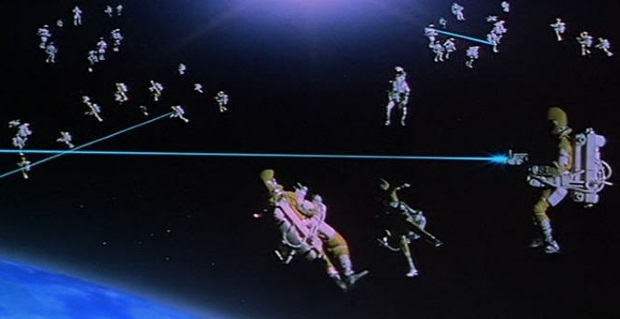
Live & Let Die can also be seen as the franchise’s answer to blaxploitation cinema, a uniquely American genre, with scenes set in Harlem and New Orleans. In fact, throughout the rest of the 1970s, the producers would occasionally be led by what was popular with American audiences at the time.
The Man With The Golden Gun references martial arts tropes, just a year after Enter The Dragon had been a major box office hit. Moonraker was bumped ahead of For Your Eyes Only after Star Wars became a worldwide phenomenon, and included the preposterous deployment of US Marines with lasers for a final battle in outer space. We daresay that iconic henchman Jaws might have been created in response to the Steven Spielberg blockbuster of the same name too.
While we’re on that subject, Spielberg was famously rejected by Eon when he wanted to direct a Bond film, and this was what spurred the creation of Indiana Jones. Like Bond, Jones is a womanising hero whose adventures take him all over the world. Although 007 only occasionally visits America, part of the Bond films’ popular appeal to US audiences, as to UK audiences, is that he travels to more exotic locations.
Indiana Jones has become distinctive from the Bond series many ways – chiefly that they have never recast the main role, even to the point where Harrison Ford is expected to reprise the role in the forthcoming fifth instalment – but Spielberg’s fandom of the British franchise was as big an influence as the 1930s adventure serials they more closely resemble.
Location, location, location…
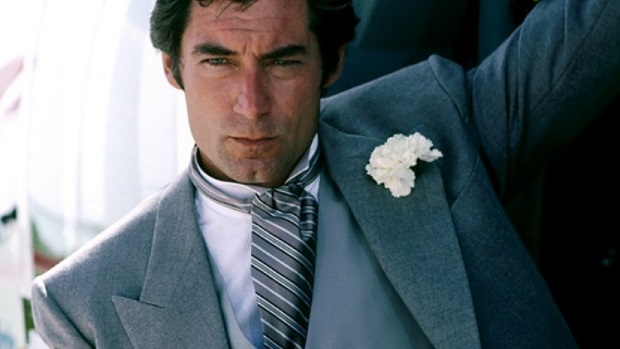
Later in the 1980s, Bond would travel back towards the States again, in A View To A Kill, which saw Christopher Walken’s psychopathic industrialist planning to destroy Silicon Valley, and far more prominently in the criminally underrated Licence To Kill, which claims two major American firsts in the franchise.
Obviously, it’s the only film in the series to be shot entirely outside of the United Kingdom, set exclusively in North America. But it’s also the first film in which Felix is a major player, adapting an unused subplot from Fleming’s Live & Let Die, in which the CIA agent is dismembered by hungry sharks, right down to the shameless bon mot “He disagreed with something that ate him.”
Strangely, even though John Terry (Jack’s dad from Lost, not the footballer) had just played Felix in the previous film, Licence To Kill brought back David Hedison from Live & Let Die, in order to get properly partly eaten this time. This incites a gruelling plot that sends Bond on a Yojimbo-inflected rogue mission against the backdrop of America’s war on drugs.
In many ways, and especially in his second outing, Timothy Dalton pre-figured the gritty, personal take that Daniel Craig popularised, and given Felix’s irrelevance in previous films, this one has to do some quick heavy lifting to sell us that they’re friends. For most, all it should really take is Dalton asserting that “He’s risked his life for me, many times,” even if that hasn’t shown in his many faced appearances.
Jinx and the two Joe Don Bakers

Through the films that followed in the 1990s, Felix went away, but his successor Jack Wade, the CIA liaison, appears in GoldenEye and Tomorrow Never Dies, continues in the flagrant disregard for the continuity of American characters by casting Joe Don Baker, who played maniacal armchair arms dealer Brad Whitaker in The Living Daylights. If you’re marathoning these films, the paradox of the two Joe Don Bakers is particularly glaring.
This is why Die Another Day comes out of the blue with Halle Berry, who coincidentally stars in Kingsman: The Golden Circle as well. Fresh off her Oscar win for Monster’s Ball, Berry plays Jinx, an NSA operative who gets just as much to do as Bond as they fend off the usual brigade of mad international villains and flirt with each other incessantly.
Such was the prominence of Jinx in the film, Eon had a spin-off series in the pipeline for her, pitched as a ‘Winter Olympics’ franchise that would see regular instalments in the years between Bond films. If we all accept that Tatum-Firth dichotomy we started with, we’re not sure that Michael Madsen’s Falco works as he’s pitched in Die Another Day, as the US answer to Judi Dench’s M, although we sometimes think that it might explain certain aspects of American foreign policy.
Elsewhere, whether by design or not, Bond’s 40th anniversary year also saw New Line Cinema release the third Austin Powers movie, just as the previous instalments had come out in the same year as Tomorrow Never Dies and The World Is Not Enough. Although the films are largely affectionate exercises of Mike Myers’ ongoing anglophilia, it’s interesting to counterpoint how Hollywood was lampooning a 1960s spy being brought up to date right alongside the series that inspired it.
Moreover, by the time of its release, Die Another Day had already been beaten to the punch by two Hollywood movies that presented a different take on secret agents – xXx and The Bourne Identity. The former opens with a tuxedo-clad spy getting assassinated, prompting the recruitment of Vin Diesel’s extreme sports star Xander Cage as the modern replacement for the establishment spy.
Meanwhile, the latter wasn’t concerned with Bond at all, but showed up Die Another Day so badly that it changed the face of the series altogether. The Jinx spin-off fell by the wayside as a troubled MGM resolved to focus on a reboot of the series proper, which led Eon to go back to the very first Fleming novel.
Felix returns
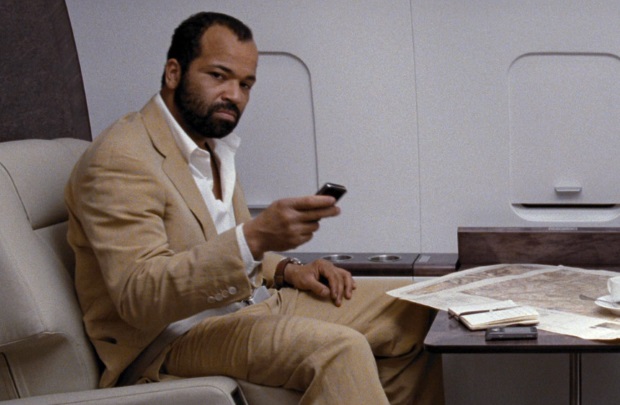
Aside from the Bourne-influenced action, including an excellent setpiece at Miami International Airport, Casino Royale finally gives our old mate Felix Leiter his original canonical role of bailing a hot-tempered Bond out with CIA funds. Jeffrey Wright is the only actor to play the character in successive sequels, getting a larger role in Quantum Of Solace.
Although the film and his screentime in it was compromised by the 2007/8 Writers’ Guild of America strike clashing with production, Wright does a good line in bristling as his CIA superior, section chief Gregg Beam (Stranger Things‘ David Harbour) colludes with SPECTRE (nee. Quantum) in order to control Bolivian oil. Again, not a flattering portrayal of Americans on the whole, but at least here, Felix is set apart from his countrymen in some way, and he’s namedropped to that effect in Spectre too, as a trusted ally.
Keeping the British end up
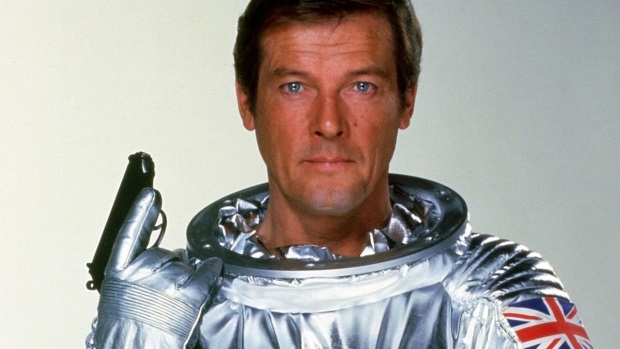
American characters can be allies (Denise Richards as a nuclear physicist) or enemies (Terry Savalas as Blofeld) but over 24 films, the series emphatically shown that they cannot be James Bond himself. Eon has actually come close to casting American 007’s in the past – Cary Grant was the very first person offered the part, and John Gavin and James Brolin were both contracted, for Diamonds Are Forever and Octopussy, and then released.
The series has never had an American director either, despite interest from names like Spielberg or Quentin Tarantino (who unsuccessfully lobbied to make a 1960s-set Casino Royale starring Pierce Brosnan back in 2004), and the history suggests that as in their screen portrayals, Eon want to keep the British end up in this special relationship.
Hollywood has dominated the global film market to a large extent for much of the franchise’s lifespan and none of this is to say that the producers haven’t been influenced by their market. For instance, Licence To Kill was also the last Bond film to be released during the summer – for a film with its eye on America, Eon somehow underestimated Hollywood offerings like Batman, Back To The Future Part II and (ironically) Indiana Jones And The Last Crusade, and they would dominate the box office that year.
And so, the now traditional November release date is definitely a side effect of the American market. Even then, although the exact UK release date for the upcoming 25th film has yet to be revealed, the initial press release made sure to note that it would be before the announced US date of November 8th 2019. In a calendar that usually goes vice versa, that’s surgical one-upmanship.
This all means that there’s a rich seam of transatlantic history and interplay for a film like Kingsman to mine and subvert. From Fleming through all of the Felixes, James Bond has largely maintained the upper hand in his interactions with Americans, placing value on their resources, but showing little interest in their character. Even as more recent instalments, have looked inwards, at Britain’s changing national identity and declining empire, there’s much you can read into from either side of the pond.

